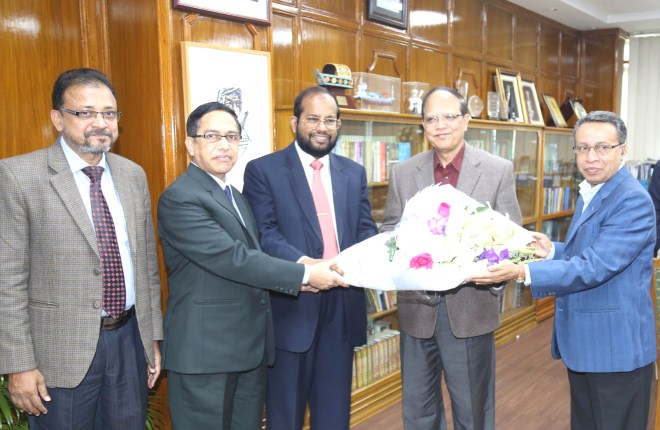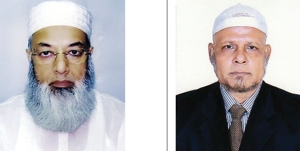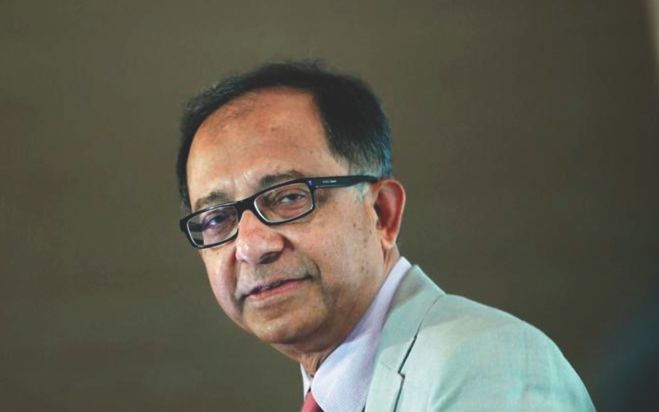Banking
Islami Bank opens 293rd branch at Dhulaikhal
Islami Bank Bangladesh Limited opened its 293rd Branch at Dhulaikhal, Dhaka on 18 December 2014 Thursday, says a press release. Engr. Mustafa Anwar, Acting Chairman of the Bank inaugurated the Branch as Chief Guest. Mohammad Abdul Mannan, Managing Director of the Bank presided over the inaugural ceremony. Abdus Sadeque Bhuiyan, Executive Vice President and Head of Development Wing, Md. Obaidul Haque, Executive Vice President and Head of Dhaka South Zone of the Bank along with local businessmen, social elites and professionals were present on the occasion.
News:Bangladesh Today/15-Jan-2015AAIBL congratulates Governor Dr. Atiur Rahman for achieving the award of Central Bank Governor of the Year, Asia-Pacific
 Dhaka: Al-Arafah Islami Bank Ltd. has congratulated the Governor of Bangladesh Bank Dr. Atiur Rahman for achieving the award of Central Bank Governor of the Year, Asia-Pacific for 2015 by UK based financial magazine The Banker. Managing Director of the Bank Md. Habibur Rahman congratulated Governor Dr. Atiur Rahman with flower bouquet at his office recently. General Manager of Bangladesh Bank A.F.M. Asaduzzaman, Deputy Managing Director of AIBL Kazi Towhidul Alam and Assistant Vice President Jalal Ahmed were present on the occasion.
Dhaka: Al-Arafah Islami Bank Ltd. has congratulated the Governor of Bangladesh Bank Dr. Atiur Rahman for achieving the award of Central Bank Governor of the Year, Asia-Pacific for 2015 by UK based financial magazine The Banker. Managing Director of the Bank Md. Habibur Rahman congratulated Governor Dr. Atiur Rahman with flower bouquet at his office recently. General Manager of Bangladesh Bank A.F.M. Asaduzzaman, Deputy Managing Director of AIBL Kazi Towhidul Alam and Assistant Vice President Jalal Ahmed were present on the occasion.
The Banker, a UK based financial magazine of the Financial Times group has declared the award of Central Bank Governor of the Year, Asia-Pacific for 2015 to Bangladesh Bank Governor Dr. Atiur Rahman, in recognition of his work exemplifying how central banks can play essential role in promoting financing of socially and environmentally responsible initiatives without compromising on growth or macroeconomic stability. Besides Dr. Rahman’s award for the Asia-Pacific region, there are four other awardees for the other regions of the world.
SIBL appoints vice chairmen

Md Sayedur Rahman.........................Abdul Jabbar Mollah
Md Sayedur Rahman and Abdul Jabbar Mollah have been elected vice chairmen of Social Islami Bank, the bank said in a statement yesterday.Sk Mohammad Rabban Ali, Md Abdur Rahman, and Nasiruddin have been elected chairman of executive committee, board audit committee and risk management committee of the bank respectively.Md Sayedur Rahman is currently the managing director of Lodestar Garments and Mid-Asia Fashions.Abdul Jabbar Mollah is a commercially important person (CIP) of Bangladesh, and currently serves as managing director of Jahanabad Sea Foods, Jalalabad Frozen Foods, and Jabbar & Co, it said.
World Bank sees growth pick-up for developing countries

The World Bank on Tuesday predicted a pick-up in economic growth for developing countries, spurred by falling oil prices and despite a slight slowdown in global engine China.
Developing countries' growth in gross domestic product (GDP) -- the broad measure of a country's output of goods and services -- was expected to hit an annual pace of 4.8 percent in 2015, up from 4.4 percent last year, and surge to 5.3 percent in 2016, according to the bank's latest forecasts.
"Following another disappointing year in 2014, developing countries should see an uptick in growth this year, boosted in part by soft oil prices, a stronger US economy, continued low global interest rates" and improvements in several large emerging-market economies, said the World Bank in a statement.
The update of its Global Economic Prospects report showed that momentum in the developing countries would like push growth in the global economy higher, to a moderate 3.0 percent in 2015 from 2.6 percent in 2014, despite persistent weakness in the eurozone and Japan.
For China, the leader of the emerging-market economies, "structural reforms, a gradual withdrawal of fiscal stimulus, and continued prudential measures to slow credit expansion will result in slowing growth to 6.9 percent by 2017 from 7.4 percent in 2014," said the anti-poverty development bank.
The GDP of the world's second-largest economy was projected to increase by 7.1 percent this year and slow slightly to a rate of 7.0 percent in 2016.
Another major emerging-market powerhouse, India, should be among the beneficiaries of the spectacular plunge in crude oil prices that have lost almost 60 percent of their value since June. The Asian giant, which is a net importer of crude oil, should see GDP accelerate to 6.4 percent this year from a 5.6 percent rate last year.
Weak oil prices also were expected to help Brazil, Indonesia, South Africa and Turkey fight inflation and reduce their current-account deficits, a major source of vulnerabilities to risks in the global economy, the World Bank said.
"What is critical is for nations to use this window to usher in fiscal and structural reforms, which can boost long-run growth and inclusive development," said Kaushik Basu, the World Bank's chief economist and senior vice president, in the statement.
Oil-producing countries, meanwhile, have been dealt a blow by the price plunge. Russia, which also is the target of Western economic sanctions, was expected to suffer a 2.9 percent economic contraction this year before crawling back into growth in 2016.
"In this uncertain economic environment, developing countries need to judiciously deploy their resources to support social programs with a laser-like focus on the poor and undertake structural reforms that invest in people," said World Bank President Jim Yong Kim.
WB scales up growth forecast
Return of political instability dims prospects: economist

The World Bank has forecast 6.2 percent economic growth this fiscal year, up from last year's 6.1 percent, supported by continued robust remittances and recovery in private consumption.
But the outlook is way below the government's target of 7.3 percent for the current fiscal year.
The growth forecast is based on the assumption of continued political stability, as witnessed throughout 2014, the multilateral lender said in the latest edition of its Global Economic Prospects report, released worldwide yesterday. But the return of political instability on the first day of 2015 has “watered down” the prospects, said Zahid Hussain, lead economist of the WB's Dhaka office.
Non-stop blockades mixed with local and nationwide hartals have badly hit farm incomes, disrupted inter-district road and rail transport, weakened buyers' confidence on the exporters' ability to deliver on time and halted the rebuilding of investor and consumer confidence, he said.
Consequently, achieving the projected growth may be very challenging, Hussain said. However, if the instability is short-lived, the target can still be met -- given the economy's often demonstrated resilience. “The latter may be inadequate if the instability prolongs like it did in the second half of 2013,” Hussain said.
Economic activities began to normalise in 2014 as social unrest abated from a spike in the run-up to national elections. Consumer confidence appeared to be returning to their normal levels, Hussain said.
As a result, private consumption demand recovered from its somewhat depressed level the previous year, supported by good agricultural harvests, rebound in remittances and a smooth functioning of the services sector, particularly transport and trade.
Exports started badly in the first quarter, but showed encouraging signs of recovery in the second quarter.
Private investment, which was stagnant the past three years, also appeared to be regaining some momentum, as witnessed by rising private sector credit growth towards the end of 2014, the WB economist said.
Sustained remittance inflow in 2014, which is a sizeable share of GDP, helped offset large trade deficits, the report said.
However, weak bank balance sheets continue to impede financing for an upturn the investment cycle, WB said.
Stressed bank loans including restructured loans exceed 10 percent of loans in Bangladesh, Bhutan, India and Pakistan.
Restructured and problem loans need to be recognised as nonperforming, even though this would impair capital (with possible need for fiscal support), according to the report.
Banking system reforms, particularly aimed at strengthening human resources, improving nonperforming loan management and raising capital ratios, would help improve financial intermediation.
The fiscal cost of food and fuel subsidies is also heavy. Energy subsidies alone amount to 6-10 percent of revenues in India and Bangladesh.
However, the decline in international oil prices has opened the prospects of saving the budgetary provisions made for energy subsidies, Hussain said.
India has taken advantage of the window of opportunity to reduce and reform subsidies and other governments in the region should follow suit, as per the report.
Furthermore, the oil price slide has strengthened the prospects of sustaining balance of payment surplus and the declining trend in inflation, according to Hussain.
The share of manufacturing in GDP has gradually increased, reflecting the impact of a programme of reforms, begun over a decade ago, which have enabled a successful integration into global supply chains, WB said.
Supply-side bottlenecks continue to hold back growth in the baseline forecast, particularly in Sri Lanka and Bangladesh, where economies are operating at close to capacity.
With power generation unlikely to keep pace with growing demand in the region, shortages are expected to persist in the near term, including in Bangladesh, India, Nepal, and Pakistan, according to the report.
Regional growth in South Asia is expected to steadily accelerate toward 6.8 percent by 2017, supported by a recovery in domestic demand, especially investment.
Global growth is expected to rise moderately, to 3 percent in 2015, and average about 3.3 percent through 2017.



